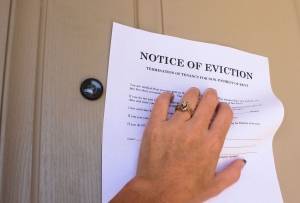
As a student at Goucher College, living in a county outside of Baltimore city proper, I want to take the time to address a very important issue that affects residents of the city and should be of concern to students as well. I recently wrote a paper about the impact of eviction on women of color in Baltimore. A 2015 report by the Public Justice Center found that Baltimore ranked second in the nation, along with Detroit, in the percentage of residents who faced eviction notices, particularly single black mothers.
The Goucher Community’s commitment to working towards a just and fair world necessitates that we are aware of the injustices that are happening at the core of our extended community beyond our campus. Though our campus commitment to feminism is palpable, similarly to the movement at large, sometimes our lens is limited and exclusive, perhaps due to our lack of experience and exposure. I’ve noticed that the conversation amongst feminists in general, as well as within the Goucher community, is lacking in two critical ways. First, those identifying as feminists do not consistently use an intersectional lens in understanding and solving issues impacting women and communities, and second, important issues are overlooked in favor of an almost singular focus on issues related to women’s bodies and reproductive rights. “Mainstream” feminists often forget that women of color cannot just think about reproductive freedom because they are not yet afforded the basic freedoms and fundamental rights granted to the majority–in particular, access to safe and affordable housing. We need to widen our focus and strive for an intersectional feminist lens both in understanding and effecting change on campus and, as importantly, within our broader community.
What do evictions look like in Baltimore, Maryland? Scholars Matthew Desmond and Rachel Kimbro have found that the effects of being evicted are felt economically and mentally by all those subject to eviction but particularly on women of color on whom the impact is even more acute. Often, following an eviction, black women and their children will face prolonged homelessness and loss or confiscation of their possessions. In effect, evicted mothers and their families suffer doubly because they are left to spend additional money on new items for the temporary household, all the while budgeting for a new unit. The Baltimore Sun and NPR reported that following homelessness, the family is often forced to relocate, forcing the mother to find a new school for her children, a new job for herself with full knowledge that layoff rates are 11 to 15 percent higher for workers who have experienced an eviction, and rebuild networks of support. During these relocation periods, women of color are often faced with moving to even poorer neighborhoods where food deserts go hand in hand with a lack of other necessary services. All these factors result in a significant, often debilitating, burden on women of color in the city of Baltimore.
Both the physical and mental health effects of an eviction have as great an impact, or more so, on poor, black women’s lives as the economic consequences because these are more long term. Desmond and Kimbro explain that single mothers are desperate to find a new home after being evicted, and thus are often more likely to settle for substandard living conditions. This can lead to significant health issues, such as asthma or lead poisoning. When housing becomes the most pressing and a disproportionately severe cost for a mother, access to other essential needs–like healthcare–become acutely strained. Black mothers evicted from their homes are more likely to face depression and psychological distress due to the extended periods of homelessness and instability as a result of eviction. The American Journal of Public Health reports that not only does homelessness cause depression, but it is demonstrably related to suicides as well. Clearly, the effects of eviction on health and access to health care often are interconnected.
What exactly we, as Goucher students, do from here about the impact of eviction on women of color in Baltimore, I can not say precisely. I hope that this has brought awareness to the topic at the very least, and that perhaps it serves as an invitation to effect change. There are many organizations in the city of Baltimore that can be a start of change such as The Women’s Housing Coalition, Right to Housing Alliance, and the Public Justice Center. However, in the long run, in Baltimore and across the country, we must reimagine public policy to mitigate and address evictions and their indelible effects head on. If we fail to do so, poor people, people of color, and particularly, black mothers will continue to face entrenched poverty and socio-economic marginalization as a result of the eviction process and its prevalence.
